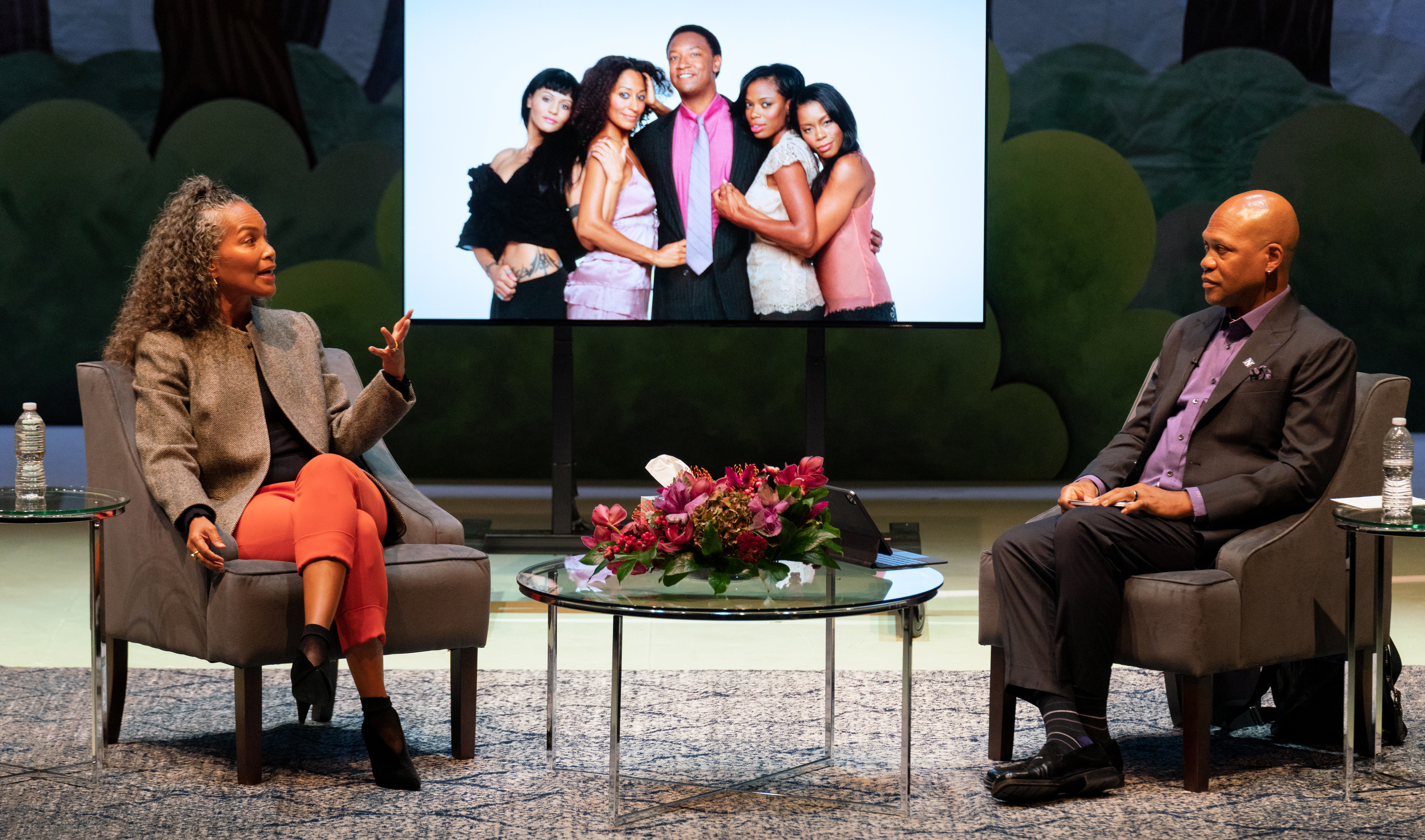
Showrunner Mara Brock Akil (BSJ96) talks career successes and life lessons with Dean E. Patrick Johnson
There’s a long road between a student and a showrunner—take the journey.”
Mara Brock Akil
Lift as we climb.
For Mara Brock Akil (BSJ96), this is not just a mantra but a throughline in a life and career spent at the creative fore. The Northwestern alum and prolific television writer, producer, and showrunner has created hits, broken records, and changed conversations through her real (and often funny) depictions of life and relationships, particularly how they play out for Black women. And she’s done all of this while helping others find their own voices and success.
Brock Akil detailed her journey to live and virtual audiences on October 6 as the first guest of the 2022-2023 academic year in Dean E. Patrick Johnson’s Dialogue with the Dean series. Throughout the conversation, held at the Josephine Louis Theater in the Virginia Wadsworth Wirtz Center for the Performing Arts, she emphasized the humanity of Black women, encouraged students to connect with their professors, and shared the honor intrinsic in hard work and creating your own value.
Brock Akil created the hit series Girlfriends, its spinoff The Game, as well as Being Mary Jane, Black Lightening, and Love Is__. She is a graduate of the Medill School of Journalism, Media, Integrated Marketing Communications (and a 2017 inductee into Northwestern’s Medill Hall of Achievement) and a fixture on high-profile lists of Hollywood’s most powerful and influential creatives. But it was a college internship at the Grand Rapids Press in Michigan that ultimately changed her perspective on how she approached storytelling.
“That was my first realization around the lack of value for Black stories or anything outside of whiteness,” Brock Akil shared. “I was thinking I got this story, and you realized very quickly that your stories did not matter. I remember the amount of hustle it took just to get a couple stories on. So, my senior year I decided: ‘I'm going to tell the truth through fiction.’”
Though Brock Akil wasn’t an SoC student, she was able to take several classes in the School and credited performance studies Professor Njoki McElroy’s Performance of African-American Literature course and the productions that the professor encouraged her to participate in for opening up a thread to the path where she is today. (McElroy even sent a video message to Brock Akil that was played during the event.) It was the late Radio/Television/Film Professor Delle Chatman, however, who not only coached Brock Akil through her first screenwriting process, but also shared knowledge and inspiration that bolstered Brock Akil on her journey.
“[Delle] was an amazing professor,” Brock Akil said through tears. “She believed in me. She was someone who said yes and someone who believed in me. She changed my life.”
But, as she observed, “There’s a long road between a student and a showrunner—take the journey.” And Brock Akil took that journey, writing for such shows as South Central, Moesha, and The Jamie Foxx Show.
“I took the job at the bottom of the totem pole and that view is how I know how to run my show(s)—from top to bottom,” Akil said.
So, she was prepared when the then-start-up network UPN came calling.
“They said, ‘We have a need.’ And I said, ‘Well, I have a show that I would love to do,’” she recalled. "I want to talk about what Black women are talking about—what's on our mind, what's in our hearts…again truth to fiction.”
When asked about the impact her breakout television show, Girlfriends, had on the portrayal of Black woman on screen in 2000, Brock Akil discussed how she told relatable stories while navigating the thin line between positive and negative stereotypes of Black women.

“You make room for the human moments, and I give them a full breadth of life,” Brock Akil said. Her characters are portraits, she explained, and by exploring their truth through comedy she could provide the audi ence with evidence of their humanity while also lovingly critiquing them and their decisions.
“I go into the nucleus of the stereotypes of these Black women because there's some truth in it,” she explained. “It's just been distorted, and it's been exploited, and it's been used against you.”
Brock Akil sees her body of work—from Girlfriends to everything that followed—as a place where Black women can see themselves and their truth.
“To see how it is now, where my children's friends are discovering the show and still feeling it’s relevant, or the ones who were watching it [back then] that shouldn't have been watching it at (age) 10,” she said. “I think that's what my spirit signed up for. I was supposed to do exactly that, and I know because the young people tell me that it liberated them.”
In 2020, Brock Akil announced a multi-year partnership with Netflix to write and produce scripted content. She also launched her new production company, story27 productions, under that deal. She plans on using these ventures to show her fans, new and old, how much she has evolved.
“Now, it’s funny, with my Netflix deal, because I did it [with Girlfriends], and then Issa [Rae] and all the rest of them did it, the pathway is still there,” Brock Akil said. “The value has grown for us to stay in the game, and we can keep building off this. So, now I get to show you who I am next.”
Brock Akil is a member of the School of Communication Board of Advisors.
Dialogue with the Dean is a quarterly event that seeks to spotlight emerging and established communicators who are advancing the future of their fields, challenging paradigms, and promoting social justice
.
